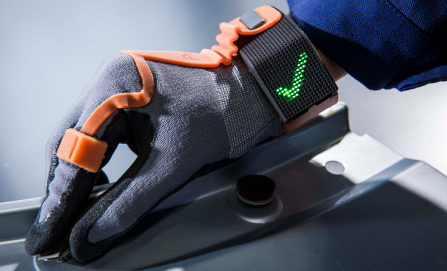ProGlove brings smart gloves to the factory floor
ProGlove brings smart gloves to the factory floor

It’s not often you hear of a start-up product that emerged from a student working in a car factory.
But ProGlove’s co-founder Paul Günther’s foray into the startup world was preceded by employment at BMW. During his studies, he was in touch daily with workers on the factory floor. One thing was clear — everyone wore gloves and if these gloves could be made intelligent, they could assist the worker to make their job easier.
ProGlove develops smart gloves that enable manufacturing and logistics staff to work faster, safer and easier. Process steps can be documented handsfree and the smart glove gives instant feedback to its user.
Current applications include the hands-free scanning of goods, monitoring and training of workflow sequences, identification of tools and parts to avoid incorrect usage, and documentation of goods and processes. ProGlove has successfully closed its first funding round of $ 2.2 million in late May, led by Intel Capital, GETTYLAB and Bayern Kapital to support the company as it prepares to launch its smart glove system.
I met with marketing manager, Tarek Ouertani, to learn more.

ProGlove seeing a lot of trade fair interest
The Munich-based company was founded in December 2014 after coming third in the Intel “Make It Wearable” Challenge with the goal to bring wearables in industry environment and make the worker ready for Industry 4.0.
The glove is based on Intel’s wearables development module Edison and the win came with a helpful $ 140,000, funds which enabled the founders to delve into hardware prototyping. Ouertani explained that the gloves are custom-created for factories and workshops where products are assembled by hand.
Each glove connects over Bluetooth or Wi-Fi and includes a rechargeable battery. Every ProGlove combines motion sensors, RFID scanning, and visual and haptic feedback to create a wearable that can be used to train new employees and automatically document a worker’s progress.
“The use of the ProGlove leads to more efficient processes and processes that lead to more quality, the main drivers of the automotive industry. A good example is when I talked to a worker on the factor floor that was building a small car component that required the assembly of 48 different parts. Each of these had to be sourced, and scanned individually before assembly. He realized that some parts were missing but didn’t know which ones. With the glove, the barcode scanning function means that workers are logging each individual component in order during assembly, meaning they are alerted if they make a mistake or leave something out.”
Ouertani noted that there had been a lot of interest in the ProGlove at industrial trade fairs, with people saying “Ooh there’s these guys with a glove so you don’t have to scan with a scanner or a bulky ring on your finger.” The glove retails at around $ 1,300 and includes the access point, module and charger.
It’s also being tested for online retailers where it can be in an efficient tool in logistical areas such as inbound logistics, packaging and palleting where workers need to handle goods with both hands and stopping to pick up a scanner constantly is an inefficient use of time.
Ouertani explained that the glove could also solve the issue of documentation in a range of sectors, including the health industry:
“We’re involved in a research project in health care looking at the needs of personal care attendants. They typically have 30 minutes per patient including washing, dressing and administering medication and part of this process can involve over ten minutes of documenting what they have done. Having a glove to document the steps they have completed means they get an additional ten minutes with their patient, doing their actual work rather than paperwork.”
I was curious to learn about their challenges as a European hardware startup. As Ouertani said:
“As a hardware industrial startup, you need more money in the early stages, before your product is market-ready and this can be difficult. Here in Germany, investors are not easy to convince to take a risk with hardware. By comparison, investors in the US take more risks.”
However there are distinct advantages to running a hardware start up in Germany. “We make products for the automotive industry and there are so many car factories and warehouses situated here, so it’s been great to have easy access to our sector and go visit these places to test things.”
The ProGlove is manufactured locally, which ensures quality control over each glove. And that emphasizes the need for manufacturing talent here to make the gloves not just to be customers. Ouertani noted:
“We think that nevertheless how many automatic processes you put in, workers are still a crucial part of the industrial process. Robots cannot substitute everything and wearables devices can be the connection point between humans and systems.”

The post ProGlove brings smart gloves to the factory floor appeared first on ReadWrite.
(78)


